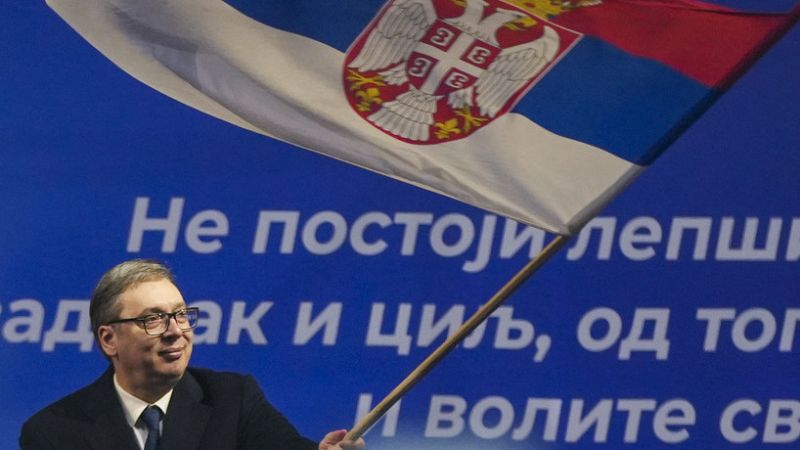Belgrade's Historic Trial: Croatian Air Force Pilots Face War Crimes Charges

The initial primary court session for the trial of four Croatian Air Force pilots, charged with launching rockets at Serb refugee convoys near Bosanski Petrovac in Bosnia and Herzegovina, commenced on Friday at the War Crimes Division of the Higher Court in Belgrade.
The indicted pilots will face trial in their absence, as they have remained unreachable by Serbian judicial authorities since the start of the investigation in 2021.
Zdenko Radulj, aged 70, Željko Jelenić, 69, Vladimir Mikac, 68, and Danijel Borović, 65, all face accusations from Serbia for allegedly executing the orders to launch rockets at refugee columns traveling along the Petrovac and Prijedor roads within the territory of the Republic of Serbian Krajina (RSK). These incidents took place on August 7th and 8th, 1995.
Thirteen individuals lost their lives during the shelling of the columns, with six of them being children below the age of 13. Additionally, around two dozen more people sustained injuries.
The bombardment, known as "Operation Storm," occurred during the peak of the Croatian War of Independence, which lasted from March 1991 to November 1995.
The dispute erupted following an independence referendum, during which many Croatian Serbs chose not to participate due to their opposition. The situation escalated when, on June 25, 1991, the Croatian Parliament formally announced its secession.
In reaction, the Republic of Serbian Krajina (RSK) declared its intent to secede from Croatia and affiliate with the Republic of Serbia, a step that was characterized by the Croatian administration as an act of rebellion.
The armed forces and paramilitary groups from the RSK started forcing Croats and other non-Serbs out of areas they controlled. At the same time, Serb residents living in Croatian towns, especially those close to battle sites, encountered frequent incidents of harassment and violence.
On August 4, 1995, the Croatian Army, working alongside the 5th Corps of the Army of the Republic of Bosnia and Herzegovina, launched Operation Storm. This military action was designed to recapture territory under occupation and lift the siege of the Bosnian town of Bihać, which is close to the Croatian frontier.
Approximately 200,000 Serbs were compelled to evacuate toward Serbia due to this military operation. While groups of Serbian civilians traveled through the town of Dvor, they faced relentless attacks from both artillery and gunfire.
On August 7th, two MiG-21s—Soviet-era fighter jets—from the Croatian Air Force fired several rockets at refugee convoys along the Petrovac road close to Bosanski Petrovac. This attack led to the death of nine people and injured more than 50 individuals, among them were four children.
On August 8th, yet another refugee convoy fell victim to an artillery attack close to the village of Svodna, resulting in further harm to civilians.
Human rights organizations like Amnesty International and Human Rights Watch denounced the attacks and mistreatment occurring during the operation.
Strained relationships among the Balkan neighbors
The two Balkan nations, which share a 241-kilometer boundary line, have experienced strained relations for quite some time now.
Recently, Tonino Picula from the Social Democratic Party of Croatia, who serves as the European Parliament’s rapporteur for Serbia, visited Belgrade but wasn’t received enthusiastically. Although Serbian President Aleksandar Vučić declined to meet with him, various state officials still interacted with Picula during his trip.
Recently, Picula criticized the Serbian government for not addressing the demands of protesters over the past few months. "Serbia could be described as being in an unannounced state of emergency," he stated when talking to Croatian journalists.
“He experiences an ongoing state of emergency mentally, which he declared ages ago. This condition affects numerous individuals in Croatia,” stated Vučić while visiting the Toplički and Jablanički regions in Vlasotince.
The Serbian Foreign Ministry called back its ambassador from Croatia last week; this was Jelena Milić, who had faced significant scrutiny and criticism from domestic media over recent weeks. There were suggestions in Croatian media outlets that Belgrade might have withdrawn her due to fears that she could be labeled as persona non grata by Croatian officials if they did not act first.
The strained relationships become even more apparent through the limited number of state visits conducted by the leaders of both nations. Since taking office in 2016, Croatian Prime Minister Andrej Plenković has made just one trip to Serbia, which was not considered an official state visit.
In 2023, Plenković traveled to the city of Subotica upon an invitation from the Croatian National Council in Serbia (HNV). During his visit, he had a short meeting with the then Prime Minister Ana Brnabic, though he did not encounter Vučic.
Aleksandar Vučić's most recent visit to Zagreb occurred in 2018 when he was invited by Croatia’s president at that time, Kolinda Grabar Kitarović.
In July 2022, Croatia prohibited the Serbian leader from making a personal trip to Jasenovac — a site dedicated to remembering those who perished at the hands of the Ustasha concentration camps during World War II — where Serbs, Jews, and Roma people lost their lives.
The Croatian leaders viewed Vučić's journey as an act of provocation and insisted that all subsequent visits must be formally announced beforehand. In response, Serbia’s Foreign Ministry issued a formal complaint, but this did not sit well with the Croatian Embassy.





